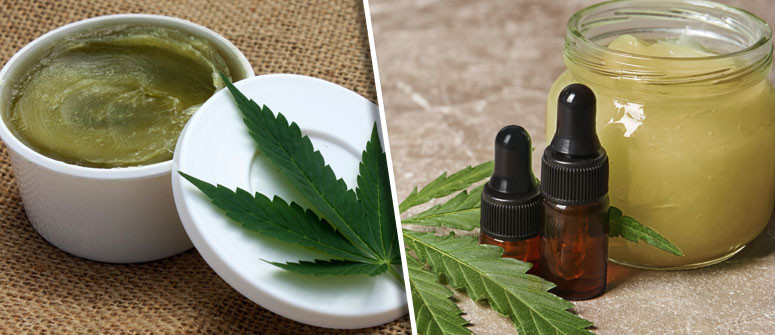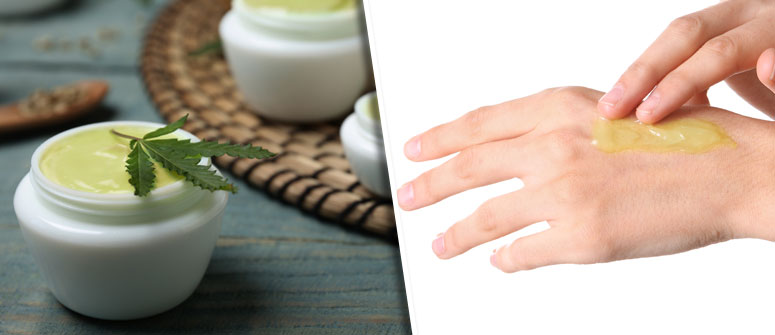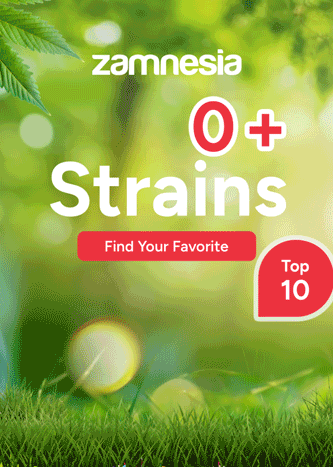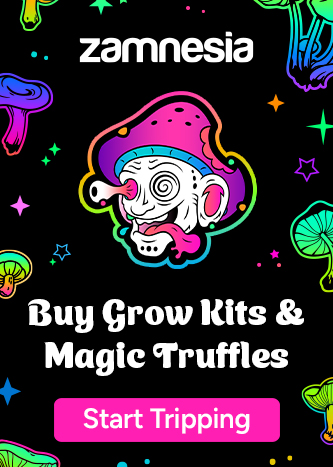Cannabis topicals: what are they and how do they work?

Cannabis topicals are cannabis-infused lotions, balms, and oils with a wide variety of therapeutic effects.
Cannabis topicals is a new line of products promising to help medical cannabis patients treat everything from chronic pain and inflammation to skin irritations. Cannabis topicals are essentially lotions, balms, oils, sprays, and lubricants infused with cannabis. They can be applied to a specific part of the body to treat symptoms like pain or inflammation.
They can contain a wide variety of cannabinoids, such as THC and CBD. But some also contain terpenes such as myrcene and limonene. Topicals can also contain other ingredients and essential oils to enhance their effect, including everything from mango butter to aloe vera.
Cannabis topicals are non-psychoactive. This means that even if they contain active THC, topicals still won’t produce the iconic “high” we experience when smoking, vaping, or eating cannabis.
HOW DO CANNABIS TOPICALS WORK?
Cannabis topicals are to be applied directly to the area of the body that requires treatment. Once applied, topicals are absorbed through the skin, where they begin to take action.
It is commonly believed that the cannabinoids found in topicals, such as THC and CBD, interact with a network of CB1 and CB2 receptors located throughout the body.
CB1 and CB2 receptors are part of our body’s endocannabinoid system, which plays a vital part in managing a variety of physiological processes (such as memory, appetite, mood, and pain) and mediating the effects of cannabis.
These receptors are either activated by the cannabinoids that are naturally produced by our bodies (known as endocannabinoids), or by cannabinoids found in the cannabis plant (known as phytocannabinoids).
However, some cannabinoids such as THC, have also been shown to produce effects independently of interacting with these receptors.
WHAT CONDITIONS CAN CANNABIS TOPICALS BE USED FOR?

A substantial amount of scientific research has gone into testing the ability of cannabis infused topicals.
This research shows that topically applied cannabinoids (in the form of creams, gels, and lotions) can have a variety of therapeutic effects and may help in the treatment of inflammation, dermatitis, and pain.
A 2015 study by a team of Italian researchers also found that cannabis topicals containing CBD might help to treat autoimmune encephalomyelitis (inflammation of the brain and spinal cord) typically associated with multiple sclerosis.[1]
The study was conducted on mice and showed that treatment with a 1% CBD cream (made with pure CBD solubilized in propylene glycol) can have neuroprotective effects that aid in the treatment of encephalomyelitis. The mice treated with the cream showed a decreased clinical disease score and partial recovery from paralysis in the hind limbs caused by the condition.
A 2013 study conducted by the Department of Dermatology and Allergy at the University of Bonn, Germany, evaluated the impact of topically applied THC on allergic contact dermatitis in both wild and CB1/2 receptor deficient mice.[2] The results from the study showed that topically applied THC effectively reduced symptoms of contact allergic dermatitis in both groups of mice. This also proves that THC is a cannabinoid that can act independently of CB1/2 receptors.
Topically applied cannabinoids have also been shown to aid in pain relief, postherpetic neuralgia (a side effect caused by shingles), psoriasis, and much more.
CANNABIS TOPICALS IN THE BEDROOM
Of course it is great that cannabis topicals can help patients to treat serious symptoms. We should also mention that it might also help you relieve an occasional headache.
But we should not forget to tell you that some cannabis topicals are specially produced for the bedroom. You can find some cannabis infused oils, which are designed to intensify orgasms, both for him and her. Not bad ha?
- ^ NCBI, A new formulation of cannabidiol in cream shows therapeutic effects in a mouse model of experimental autoimmune encephalomyelitis., retrieved February-01-2017
Link - ^ NCBI, Anti-inflammatory activity of topical THC in DNFB-mediated mouse allergic contact dermatitis independent of CB1 and CB2 receptors., retrieved February-01-2017
Link




